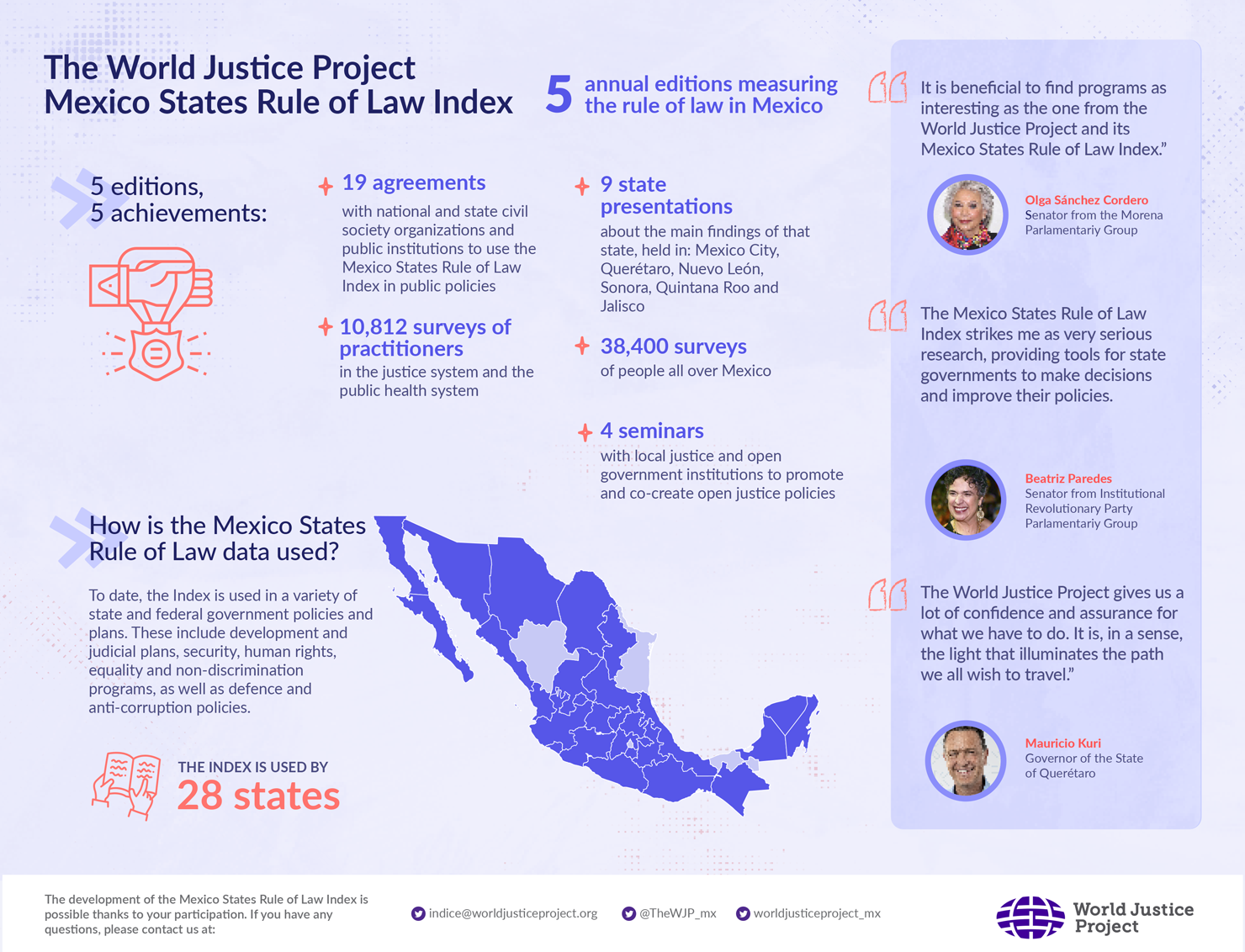

At a well-attended report launch this week, two Mexican state leaders from opposing political parties came together in common cause.
The cause was the rule of law. And the tone of the event was, perhaps surprisingly, largely optimistic.
“In Querétaro, we always aspire to have more, to do more, to have more security, to be better,” said that state’s governor, Mauricio Kuri. “And the only way to achieve that is with solid rule of law and with institutions that are very, very strong.”
Globally, Mexico ranks in the bottom fifth of countries on rule of law (115 out of 140), according to the latest World Justice Project (WJP) Rule of Law Index. But Wednesday’s event focused on a different index—the WJP Mexico States Rule of Law Index.
This subnational Index zooms in on rule of law performance at the state level and compares it across Mexico’s 32 states. Now in its fifth edition, the latest Mexico States Index demonstrates what WJP researchers have long understood: national survey data can mask notable trends playing out at the state level.
Six Mexican states show rule of law progress is possible
On Wednesday, WJP and Mexico’s National Bar Association of Corporate Lawyers hosted more than 100 policymakers, civil society leaders, journalists, businesspeople and researchers to discuss findings from the new 2022-23 Mexico States Rule of Law Index, including several notable trends—both positive and negative.
On the positive side, WJP data shows that six Mexican states have made outsized progress on rule of law in the last five years.
Querétaro, which ranks as the top state for the second year in a row, moved up from fifth place in 2018. Governor Kuri said the state has put a major emphasis on fighting corruption and improving rule of law more broadly.
“In order for Querétaro to attract more investment, it needs to bet on the rule of law,” he said. “Even before education, we first need rule of law. Because everything else comes out of that.”
Also in attendance was Guillermo Noriega, the Secretary of the General Comptroller of Sonora, which climbed from 29th place to 20th. Noriega said his state understands that rule of law is key to creating economic opportunity, and he shared examples of open government and anti-corruption initiatives such as automatically investigating video from police body-worn cameras when people file corruption complaints.
“We’re committed to continuing to improve,” he said, “not only on the Mexico States Rule of Law Index, but on what the Index is really about, which is the quality of life for the people of Sonora.”
The other four states that have improved dramatically are Baja California Sur (from 31st place to 5th), Guanajuato (from 12th to 2nd), Tamaulipas (from 19th to 12th place), and Sinaloa (from 11th to 5th place).
“These Mexican states demonstrate to others that it is possible to strengthen the rule of law–even in complex and challenging contexts,” said Alejandro Ponce, WJP’s chief research officer. “However, even such promising progress is not enough. All of Mexico’s states face enormous rule of law challenges.”
Rule of law trends in Mexico
Even Mexico’s top-performing states, with scores of 0.49 out of 1, measure below the halfway point on the WJP rule of law scale of 0 to 1. As in its global Index, the WJP measures overall rule of law in Mexican states by evaluating eight factors: constraints on government power, absence of corruption, open government, fundamental rights, order and security, regulatory enforcement, civil justice, and criminal justice.
On average, rule of law performance is largely stagnant in Mexico, but WJP identified several other trends that are affecting a majority of states:
- Order and security scores have improved in two-thirds of Mexican states, largely due to improvements in people’s perceptions of safety. However, homicide and crime rates remain at worrying levels, and order and security scores remain weak across the country. (Read how WJP is working to counter Mexico’s impunity crisis).
- The effectiveness of the civil justice system also improved in two-thirds of states, with post-COVID timeliness of proceedings improving in 24 of 32 states. Alternative dispute resolution mechanisms continue to be perceived as the most effective aspect of civil justice in Mexico.
- In contrast, criminal justice faces persistent challenges across the states. Scores for the effectiveness of criminal investigations are particularly low (the average state score is 0.21 out of 1), while rates of unreported crime are very high.
- The fight against corruption remains stagnant throughout most of the country, as in previous years. Only seven states made any progress this year, and the progress was minor.
- Civic space continues to shrink for the third year in a row. The ability of the press, civil society organizations, and opposing political parties to serve as effective counterweights to government power is receding in 20 states.
A call for collaboration
Speakers at Wednesday’s event underscored that the Mexico States Index is an important diagnostic and benchmarking tool for any state that wishes to advance rule of law reforms.
“The fact that you're doing this research is really helpful for us in the government to know what we're doing well and what we're not doing well in,” Kuri said. “With this information, we can take note and work to improve the rule of law."
Twenty-eight states have already adopted the Index into policymaking at some level. Five national anti-corruption, accountability, and human rights plans and programs have done so as well.
“This Index is a great tool that provides the measurable, up-to-date information needed to take up a viable and informed decision-making process,” said Nuhad Ponce, president of the National Bar Association of Corporate Lawyers.
But it’s not only a matter of government officials designing policies to protect the social good and the rule of law, she said.
“It’s also about what the citizenry and the private sector can do to work with them to advance new initiatives.”
New opportunities beyond Mexico
The value of subnational rule of law measurement is not limited to countries that rank poorly on a global level. In fact, WJP is embarking on a new project to study subnational rule of law performance in some of the world’s top-ranking countries.
As part of the European Union’s deep commitment to upholding rule of law among its member states, the European Commission has engaged the World Justice Project to create a new subnational study of the rule of law in all 27 EU member states. WJP will evaluate the rule of law in more than 100 regions across the EU and expects to publish the new data in June of 2024.
“Our work in Mexico has been effective in promoting change, and we hope it serves as a blueprint to inspire work of a similar nature in other regions and countries,” WJP Executive Director Elizabeth Andersen said at Wednesday’s launch event.
“We hope that, as in previous editions, [the Mexico States Index] will be used to inform and generate policies that will improve people’s lives.”

Explore the data from the WJP Mexico States Rule of Law Index on our interactive portal (in Spanish).
An English-language version of the 2022-2023 report is forthcoming.
Sign up to get the latest rule of law data and insights delivered to your inbox.






